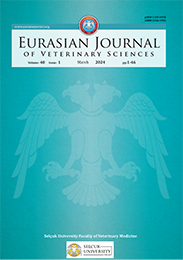| 2022, Cilt 38, Sayı 3, Sayfa(lar) 150-158 | |
| [ Özet ] [ PDF ] [ Benzer Makaleler ] [ Yazara E-Posta ] [ Editöre E-Posta ] | |
| Histopathological evaluation of the effects of thymoquinone and resveratrol on the liver in rats administered doxorubicin | |
| Mehmet Burak Ates1, Ozgur Ozdemir1, Ali Erdem Ozturk2, Mustafa Numan Bucak3, Aysegul Bulut1 | |
| 1Selcuk University, Veterinary Faculty, Department of Pathology, Konya, Turkey 2Erciyes University, Veterinary Faculty, Department of Reproduction and Artificial Insemination, Kayseri, Turkey 3Selcuk University, Veterinary Faculty, Department of Reproduction and Artificial Insemination, Konya, Turkey |
|
| Keywords: Liver, histopathology, doxorubicin, thymoquinone, resveratrol | |
| Abstract | |
Aim: The purpose was to investigate the effects of various dosages of
thymoquinone and resveratrol (5 and 20 mg/kg) on doxorubicin-induced
hepatotoxicity in rats from a pathological standpoint. Materials and Methods: Eighty male Wistar Albino rats were used in this study. Animals were divided in to 10 groups: Control (physiological saline, PO); Doxorubicin (physiological saline, PO and Dox,15mg/kg Dox in 10th days, IP); Thymoquinone -5 (TQ-5, 5 mg/kg TQ, PO); TQ-20 (20 mg/ kg TQ, PO); Resveratrol-5 (Res-5, 5 mg/kg Res, PO); Res-20 (20 mg/kg Res, PO); Dox+TQ-5 ; Dox+TQ-20; Dox+Res-5; Dox+Res-20. After the 21-day experiment, 6 replicates were randomly selected from the groups. After weighing the body weight, the livers of the euthanized rats were dissected and weighed. Routine tissue processing processes were applied to liver samples. Hepatocyte degeneration, necrosis/apoptosis, bile duct hyperplasia, dissociation, congestion, karyomegaly, mononuclear cell infiltration, binuclear hepatocytes, and mitosis were all examined microscopically, and a liver total lesion score was calculated Results: Dox treatment increased relative liver weight, but the TQ and Res groups prevented this increase (p<0.05). The liver total lesion score, which increased with Dox, was shown to be lower in the TQ and Res groups (p<0.05). However, the Dox+TQ-5, Dox+TQ-20, and Dox+Res-20 groups, showed no amelioration in necrosis/apoptosis. Conclusion: TQ and Res (5 and 20 mg/kg) decreased the total liver lesion score induced by Dox. Although TQ and RES diminish degeneration and inflammation, their poor protective effects on necrosis/apoptosis, one of the key criteria, were considered as a limiting cause for their uncontrolled usage. |
|
| [ Başa Dön ] [ Özet ] [ PDF ] [ Benzer Makaleler ] [ Yazara E-Posta ] [ Editöre E-Posta ] | |




